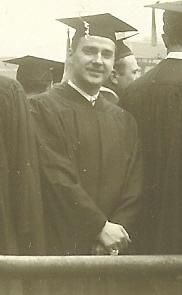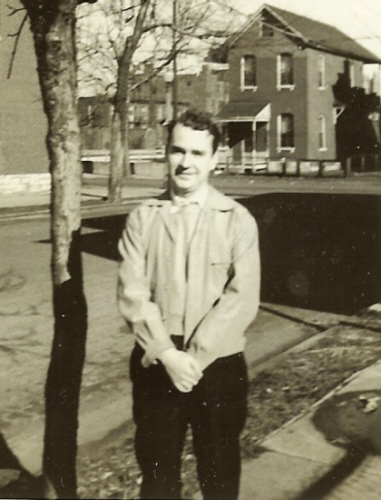The Mass and how I Learned to Assist at it
by
Lawrence E. Rogers
(This is an essay by my father, Larry Rogers, that he wrote when he was a student at St. Louis University. He received an A from the professor. I hope that you enjoy reading this essay.)
 Some claim that most Catholics do not really assist at Mass, that they merely go to Church. There probably is much truth in this but one thing has been overlooked in making such a judgment. The Catholics who may not be in possession of an intimate knowledge of the Mass go with the intention of adoring God, of rendering their duty to Him, of pleasing Him. Their very presence is an acknowledgement of their duty to their Creator and Redeemer.
Some claim that most Catholics do not really assist at Mass, that they merely go to Church. There probably is much truth in this but one thing has been overlooked in making such a judgment. The Catholics who may not be in possession of an intimate knowledge of the Mass go with the intention of adoring God, of rendering their duty to Him, of pleasing Him. Their very presence is an acknowledgement of their duty to their Creator and Redeemer. Yet this is not offering sacrifice, and here lies a stumbling block for me. The idea of sacrifice was not understood by me until I was about fifteen years old, and then only incompletely in having the three principal parts stressed with some appreciation of each. But does this mean that all the time previous to this I was not assisting at Mass?
Yet this is not offering sacrifice, and here lies a stumbling block for me. The idea of sacrifice was not understood by me until I was about fifteen years old, and then only incompletely in having the three principal parts stressed with some appreciation of each. But does this mean that all the time previous to this I was not assisting at Mass?It was my privilege to go to a Catholic grade school so I was always kept close to the Mass. My memory of the exact way in which I assisted at Mass during my grade school years is vague. However, I believe that as a whole I was reverent and was aware that I was in the presence of God, but my manner of assisting was mostly in saying “Our Fathers” and “Hail Marys.”
 One thing that stands out in my mind is my years as an altar boy. I was probably the worst server who ever existed, but still I enjoyed it. I always felt honored to be so near the altar while all others were so far back. This experience as a server did make me feel that I had an important part to play in the Mass.
One thing that stands out in my mind is my years as an altar boy. I was probably the worst server who ever existed, but still I enjoyed it. I always felt honored to be so near the altar while all others were so far back. This experience as a server did make me feel that I had an important part to play in the Mass. After I graduated from grade school, I was no longer required to sit in the center aisle reserved for school children. There was one spot in the church where the older boys congregated. It was near the rear corner and behind a pillar. There might be hundreds of empty pews throughout the church but we invariably jammed ourselves four or more in a pew, if necessary, in our “section.”
After I graduated from grade school, I was no longer required to sit in the center aisle reserved for school children. There was one spot in the church where the older boys congregated. It was near the rear corner and behind a pillar. There might be hundreds of empty pews throughout the church but we invariably jammed ourselves four or more in a pew, if necessary, in our “section.” I believe we were far from being the “humble publicans’ and those in the front of the church all “proud Pharisees.” It was difficult to concentrate on the Mass under the circumstances for the pillar and boys so tall they might be pillars completely obscured the view of the altar and also there were other distractions.
I believe we were far from being the “humble publicans’ and those in the front of the church all “proud Pharisees.” It was difficult to concentrate on the Mass under the circumstances for the pillar and boys so tall they might be pillars completely obscured the view of the altar and also there were other distractions. For about two years I stuck with the “rear guard.” We were not a group of impious rascals. There were many fine boys in the group. I do not know how they assisted at Mass. They probably did well, but I know that I was not assisting as well as I should
For about two years I stuck with the “rear guard.” We were not a group of impious rascals. There were many fine boys in the group. I do not know how they assisted at Mass. They probably did well, but I know that I was not assisting as well as I should During my sophomore high school year, our religion class was given a paper on which was printed each step in the Mass with which was paralleled a happening in Christ’s Passion. I believe that I gained considerable help from this linking of prayers and actions of the priest with events in Christ’s life. Just about this time I began to get definitely organized in my mind the three principal parts of the Mass and the significance of each.
During my sophomore high school year, our religion class was given a paper on which was printed each step in the Mass with which was paralleled a happening in Christ’s Passion. I believe that I gained considerable help from this linking of prayers and actions of the priest with events in Christ’s life. Just about this time I began to get definitely organized in my mind the three principal parts of the Mass and the significance of each. That one does not learn to appreciate a good thing until he must do without it was impressed upon me when for several months I did not have the opportunity, because I was ill, of assisting at Mass. Sunday after Sunday I did what I could by reading the Mass prayers and by listening to the broadcast from the College Church. This was far different from being actually present in Church. The hardest thing of all for me, however, was to be denied the privilege of attending Mass on Christmas Day. When I was allowed to go back to Church, the first time I was made to realize how important the Mass was to my life.
That one does not learn to appreciate a good thing until he must do without it was impressed upon me when for several months I did not have the opportunity, because I was ill, of assisting at Mass. Sunday after Sunday I did what I could by reading the Mass prayers and by listening to the broadcast from the College Church. This was far different from being actually present in Church. The hardest thing of all for me, however, was to be denied the privilege of attending Mass on Christmas Day. When I was allowed to go back to Church, the first time I was made to realize how important the Mass was to my life. At the present time I assist at Mass in the following way:
At the present time I assist at Mass in the following way: I say the prayers with the priest; at the Gospel, I simply speak to God saying that I stand to show my love for His word and I beg Him to grant me the grace to know His Gospel well and to bring others to know it and to love it.
I say the prayers with the priest; at the Gospel, I simply speak to God saying that I stand to show my love for His word and I beg Him to grant me the grace to know His Gospel well and to bring others to know it and to love it. At the Preface, I recite the “Apostles Creed.” During the Offertory, the Consecration, and the Communion, I try to unite myself as closely as possible to the spirit of the sacrifice. I offer myself to God and ask Him to accept my offering as I join it to the sacrifice of Jesus, knowing that it is through Christ’s merits and not through my own that I can be made pleasing to Him.
At the Preface, I recite the “Apostles Creed.” During the Offertory, the Consecration, and the Communion, I try to unite myself as closely as possible to the spirit of the sacrifice. I offer myself to God and ask Him to accept my offering as I join it to the sacrifice of Jesus, knowing that it is through Christ’s merits and not through my own that I can be made pleasing to Him. When the Sacred Host is elevated, I adore God as best I can and I profess my unworthiness to be here in His divine presence. I tell God I am sorry for all my failures of the past and I intercede for the grace which will enable me to resist evil and to do good.
When the Sacred Host is elevated, I adore God as best I can and I profess my unworthiness to be here in His divine presence. I tell God I am sorry for all my failures of the past and I intercede for the grace which will enable me to resist evil and to do good. When I receive Communion, I first of all welcome God to the house of my heart and as I walk back to my pew, I ask God to be always with me as I walk through life. I thank Him for His goodness to me and particularly for having allowed me to assist at this present sacrifice and for having permitted me to receive Him. I profess that everything good in my life has been given me by Him and I tell Him that I know that only through His mercy can I hope for eternal salvation. I beg God to hasten the movement when all my loved ones and myself will be united with Him in His eternal kingdom.
When I receive Communion, I first of all welcome God to the house of my heart and as I walk back to my pew, I ask God to be always with me as I walk through life. I thank Him for His goodness to me and particularly for having allowed me to assist at this present sacrifice and for having permitted me to receive Him. I profess that everything good in my life has been given me by Him and I tell Him that I know that only through His mercy can I hope for eternal salvation. I beg God to hasten the movement when all my loved ones and myself will be united with Him in His eternal kingdom. I always have distractions at Mass. Not simply the embarrassment of sitting on the hat of the gentleman next to me but thoughts of good times had or contemplation of future plans, continually come into my mind. I try to minimize these distractions as much as I can.
I always have distractions at Mass. Not simply the embarrassment of sitting on the hat of the gentleman next to me but thoughts of good times had or contemplation of future plans, continually come into my mind. I try to minimize these distractions as much as I can. The things about the Mystical Body of Christ, about his being our Mediator and High Priest, and about the basic ideas of sacrifice which I have learned in this course are helping me. Only if I can unite this knowledge with deep love can I profit as much as I should.
The things about the Mystical Body of Christ, about his being our Mediator and High Priest, and about the basic ideas of sacrifice which I have learned in this course are helping me. Only if I can unite this knowledge with deep love can I profit as much as I should. I am convinced that one comes to assist better at Mass as he comes to live more; as he comes to know sorrow and to realize wherein final joy resides; to know failure and to come to see where success will lie; to know loneliness and to find Him Who is our only lasting and perfect Friend; to have faced death and to have impressed what lies beyond; to see real goodness in other human beings; to have had a pure, unselfish, trusting love for some human being and to contemplate how infinitely more lovable is God; to have lost those whom one loves most and to have faith that they are with Our Heavenly Father. (I wonder how atheists reconcile themselves to the loss of a dear one. Can they actually accept the thought that genuine goodness vanishes into nothingness?)
I am convinced that one comes to assist better at Mass as he comes to live more; as he comes to know sorrow and to realize wherein final joy resides; to know failure and to come to see where success will lie; to know loneliness and to find Him Who is our only lasting and perfect Friend; to have faced death and to have impressed what lies beyond; to see real goodness in other human beings; to have had a pure, unselfish, trusting love for some human being and to contemplate how infinitely more lovable is God; to have lost those whom one loves most and to have faith that they are with Our Heavenly Father. (I wonder how atheists reconcile themselves to the loss of a dear one. Can they actually accept the thought that genuine goodness vanishes into nothingness?) All these personal experiences will deep and purify and increase one’s love of God if one can receive them patiently and extract from them the wisdom that is there. It is simply a question of rendering one’s self susceptible to that which is crying out to be heard --- the longing of the soul for union with God. “My heart will not rest, O Lord, till it rests with Thee.”
All these personal experiences will deep and purify and increase one’s love of God if one can receive them patiently and extract from them the wisdom that is there. It is simply a question of rendering one’s self susceptible to that which is crying out to be heard --- the longing of the soul for union with God. “My heart will not rest, O Lord, till it rests with Thee.”



